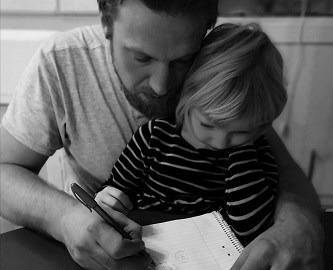
1. Mom and Dad feel more like pill dispensers or medical workers and less like parents!
I know what it’s like to coax my child to take medication.
Sometimes kids don’t want pills, yet they need them, and medicine sparks arguing, whining, and fighting. Making sure your child stays as healthy as possible may require you to gather all your strength and patience to take on yet another day’s fight.
Sometimes kids have a say in what medications they take and sometimes they can’t. I found that taking pills got better as my children got older. They saw first-hand the benefits of their medicine.
I give my daughter (12) a reward every six months for willingly taking (4-5 pills) x four times a day. Doctors saw her body wasn’t functioning correctly.
Sometimes the care parents give isn’t pills. It’s dressing wounds, stimulating muscles, bathing, dressing, feeding, changing tubes, and much more.
It doesn’t matter what kinds of care you give if your child doesn’t want help or tires of physical therapy, it can be incredibly tiring to get Him/her to cooperate for their good!
I wish I could skip the medical interactions and just spend regular mom time with my kids!
Annie
What to do when mom and dad become a nurse at home?
- Try to make interactions fun. Don’t compartmentalize life. All interactions (That don’t include whining, fighting, etc.) can be good interactions with your child.
- Use the time your child sits down to take their pills to have a meaningful conversation or take pills while you watch your favorite sitcom to make it less dramatic and have fun together!
- I have some pills I need to take, so my daughter and I take medications together.
- Use reward charts or decide on a prize for your child to increase cooperation.
- Don’t forget time is precious. If you and your child can have fun together doing mundane everyday things, bathing, taking pills, changing bandages, etc., then what your child will remember from their childhood is that mom (dad) was super fun! The hard parts seem to fade away with time.
- Try to make changing bandages, bathing, therapy ect into a game.

2. It’s emotionally draining when you need your child to cooperate for their good, and they refuse to take a bath, eat, brush their teeth, poop, take their pills, change a bandage, etc.
When I have yet another argument with one of my kids about eating, taking a shower, taking pills, etc. I have to remind myself not to shoot myself in the foot!
Sometimes kids push all the right buttons, and parents’ patience unravels like a thin, frayed, blue yarn.
Annie Eklöv
Often it’s not the fact that parents lose patience and explode. It’s a state of exhaustion.
It’s the slow emotional drain from living with someone who isn’t well and the constant worry that exhausts.
That feeling of udder exhaustion can hit you when yet again, everyday things, things that others take for granted, become a kicking, screaming, fighting mess!
Annie
It’s in those moments when you look around your home and wish to lock yourself and your cellphone in the bathroom, letting your house deteriorate and your kids binge out on screens and junk food!
We’ve all been there, felt our body deflate, and thought, ‘Not again!’
Sometimes I shake my head and wish that everyday things would just work!
When I notice other parents glancing sideways at us at the grocery store (my kids are incredibly inflexible and loud), I wonder if they know how great their lives are! Small things like having children who read social cues and who actually eat without coaxing make life so much easier!
What to do when your special needs kids drain your emotions, leaving you tired and lethargic?
- Do a self-analysis. When I am faced with yet another bedtime or mealtime battle, and I know I’m already exhausted, I do a self-analysis and decide how much energy I have to accomplish the tasks at hand. Then I prioritize where to use my energy.
- Example of self-analysis, I’ve worked all day and picked up tired kids from school and daycare, I didn’t sleep much because two of my three kids were up at night, and one child had a fight with a friend, and I’ve spent emotional energy on the phone with the friend’s mother trying to sort it out. At that point, I’m deficient in both physical and emotional energy. My kids beg to eat dinner in front of the TV. Generally, mealtimes are hard at our house. My kids don’t want to eat, and they can’t sit still at the dinner table. Eating in front of the TV distracts and helps them to eat more. Knowing I’m already a frayed blue yarn, I give in and let them eat in front of the TV. Knowing I didn’t have enough energy to facilitate a family dinner (especially when my husband wasn’t home to help) helped me decide what to do. I use the TV time to recharge and get ready for the bedtime challenge.
- Don’t shoot yourself in the foot. What I mean by don’t shoot yourself in the foot is that you don’t always have to stick to your guns at all costs. Sometimes I’ve answered my kids with an automatic, ‘No!’ Especially when I am extra exhausted, no seems to fly out of my mouth extra often, but many times I’ve said no and instantly realized I didn’t want to say no. I’ve learned that sometimes it’s better to tell my kids, ‘I’m sorry, I replied without thinking it through. What I’d like to say is yes!’
- Keep your mouth shut till you know what you want to say! To avoid shooting myself in the foot. I try to buy myself some time when my kids ask for things, and I’m beyond tired. Maybe I tell them I need to talk to daddy or that I need five minutes to think it over, but the point is not to give answers that I haven’t thought through.
- Stay calm. Getting all bent out of shape causes a chain reaction at our house. When my kids are on edge; if I blow up, they blow up!
- permit yourself to let your kids stay up fifteen minutes later, skip bath time, play iPad in bed, etc. Let your kids know it isn’t a recurring event but give yourself fifteen minutes to recharge and have a little you time. At the same time, try to negotiate with your children, so they go poop, get partially ready for bed, and take their pills (Whatever you need) before they get to do the fun stuff.


3. Parents have less time to do fun activities with their kids because they must juggle doctor appointments, home medical care, emotional support, etc.
We spend a lot of time going to doctor appointments, eye appointments, the pharmacy, etc., and I need to sort pills and make sure my kids take them several times a day. I always have meetings to manage and specific times to remember things. In other words, my workload is always on my mind.
Even with Google Calender, I am worried about forgetting appointments.
A typical day at our house requires giving my kids emotional support. They often get stuck on something that went wrong or just stuck on a negative feeling and need help to get unstuck.
Some days I feel I’m required to be a doctor, a nurse, a psychologist, and a psychiatrist even though the only thing I’ve been formally trained for is a nurse’s assistant!
Annie
All the different hats we wear as parents take time and patience.
How parents can compensate for doctors appointments etc. that special needs kids feel are scary, frustrating, or a waste of time.
- Periodically take your kids out of school. When we have an appointment with the doctors in the next town, I take my child out of school for the whole day. We don’t need the entire day for the appointment, but it’s an hour drive, and it seems a waste to rush back when we have a chance to spend quality time together without siblings. We have fun shopping and eating out before or after the appointment. This may seem extreme, but school is not my kids’ strong side, and I feel that strengthing my relationship with my children is more important than missing a few school days throughout the year.
- Make whatever appointment you’re going to have fun by giving a reward. That may mean taking your kids out for ice cream, riding the carousel at the grocery store, or driving to a store so your teen can look at electronics afterward.
- When you give emotional support, try to end your talk with something funny, so you can laugh together or do something fun with your child to change the emotional climate. Sometimes kids need you to help them and then be left alone. In that case, try to incorporate some fun with your kid later in the day. All parents need to support their kids through emotional ups and downs. Still, for kids with ADHD, ADD, Autism, or Sensory Processing Disorders, it can require parents to have extreme patience while helping kids navigate being bent out of shape over small things that may seem trivial. Sometimes it’s hard to show empathy in these situations.

4. Watching your child struggle to make friends and not get invited to birthday parties can break your heart.
As a parent, you just want the best for your child. Your instincts tell you to protect your children from emotional and physical harm, but sometimes you can’t do that.
Sometimes other children are outright mean! Kids can be unfiltered and blatantly ask, ‘What’s wrong with your child?’ Questions like these may break the ice and help your child join the games at the park, but sometimes they’re followed by, ‘Eewww! He has cooties!’ Immediately ostracizing your child at the playground.
It can be even more complex when kids feel something off or different about your child, but there are no physical signs to tell them what is wrong. Diagnoses like ADHD (Hyper, combined, and inattentive types), Sensory Processing Disorder, Autism, and even extreme cases of Dyslexia can cause a child to seem ‘Different’ to their peers.
Watching kids being shunned for things they have no control over is heartbreaking.
Kids with diagnoses often lack social skills, mainly because they lack practice in being social. The root of the problem is they lack friends.
Annie Eklöv
What to do when ‘Normal’ kids ostracize children with diagnoses?
- Younger kids are often easier to deal with when it comes to name calling, making fun, or freezing out other children. Often talking to the parents and asking them to intervene is necessary.
- You may find the bully’s mom and dad are helicopter parents who insist their child hasn’t done anything. If that is the case, try to get the parents to stop the bullying, but don’t waste your time trying to become friends with the family. You may need to ask the school or teacher for help to ensure your child isn’t bullied.
- Hopefully, you’ll meet with parents who care enough for their child that they take action to teach him/her how to meet others (who are different) positively. A family like this can be worth your while. If you get over the children’s initial differences, you may find that your child found a new friend.
- Older kids are harder to crack. When name calling is whispered, most of the behavior that needs addressing is ‘Anti Behaviour,’ In other words, the problem is things the kids are not doing. Not saying hi, Not recognizing that a particular child exists. Not inviting certain kids to parties, ext.
- You can always contact a bully’s parents, but if parents of older kids force them to invite your child over, it may be a bad experience all around. If the parents are willing to work with you, try to devise a plan together and be honest about your child’s needs, short comming, and diagnoses.
- When the parents won’t help, contact the school.
- I had to move my son to a parallel class to avoid a situation where almost all the kids in his class froze him out, and he sat by himself at breaks. On top of that, unkind talk about my son filtered through the class and was finally heard by a teacher. I had to stick to my guns and insist that the school move him and do it quickly!
- The school may need an extra adult at recess or in the cafeteria to remedy the situation.
- Anti-behaviour can be accompanied by mean texts or insensitive posts on social media. You may want to glance at your child’s phone periodically. I know that may feel like a breach of privacy, but if your child is receiving hate mail, they most likely need a grown-up to intervene and save the self-esteem they left.

5. Explaining the unwritten rules of being successfully social to kids who struggle with social codes isn’t easy for parents.
Social codes!!! You are required to know these unwritten rules, yet learned by osmosis, most of society can’t easily explain the codes they rigidly follow!
Annie Eklöv
Those who can’t read these codes or who don’t learn by carefully watching and copying their peers need more help than the average Joe can give off the top of his head.
Kids need to know why certain behaviors are expected of them, and they need to be taught social codes from the ground up! For instance, When you meet someone you know at the store, you should SMILE, shake hands, and ask how they are doing. When you meet someone for the first time, SMILE, shake hands, and say hi.
I remember struggling socially as a kid. I may have been a bit socially starved because we rarely met kids my age. At least, that is how it seemed.
I possibly never met the same kids enough to form deep friendships because I always felt excitedly nervous whenever other children came over. (I know my mom regularly watched several other kids when I was little, but I have few memories of that.)
The result of my longing to meet other children was this; I was so excited friends were coming that I talked incessantly. When they arrived, I was much too hyper to be a good playmate!
Annie Eklöv
I remember getting in trouble for being a pest when we had guests. Mom was bewildered because I wanted playmates, yet I didn’t function well with them when they arrived. I believe I have ADHD (I am waiting for a time to get a diagnosis). That wasn’t something often talked of or diagnosed in the 80s.
Many had the same experience I did. It’s easy to write off small children not meshing with others as tiredness, etc., but kids get older, and by the time some parents figure out there is a real problem, they’ve waited (almost) too long.
It’s sad when kids don’t get the help they need when they are small, but there is a better awareness of ADHD, Sensory disorders, Autism, etc., today than when I was a kid. That makes a huge difference in catching social problems early.
Annie Eklöv
What to do when your child can’t read social codes.
- Don’t ignore the signs if one of your young children makes social outings, events, or having people over a trying experience. Signs can include…
- Kids begging not to go somewhere social or asking not to have guests over.
- My son didn’t say much before we had guests over, but when they were here, he kept asking everyone to be quiet and quit laughing, and he repeatedly told everyone (including the guest) that there were too many people in his house.
- Hiding when guests come over or in social situations. My son felt daycare was too social and hid under the daycare furniture to avoid other kids.
- Kids who walk through other kids’ lego builds, train setups etc., often aren’t reading the social situation aboud them correctly. Most likely, they have no idea that they just destroyed someone else work!
- Hitting
- Excessive whining and crying over nothing in imparticular.
- Not responding with correct social responses.
- Not giving others a good vibe. Not smiling at others etc.
- Kids are hanging on parents’ legs, arms, etc., excessively in social situations.
- Kids talk all the time with people outside their immediate family. (My son did this often!) When I had a friend over, I didn’t actually get to talk to her!
- Kids may make their parents care for them the whole time they are in an insecure social situation. The parents can’t be social themselves because their child is interrupting, needs help going to the bathroom although they don’t usually need help, keeps hurting themselves, or ‘Thinks’ they need a bandaid for no reason. The child may hang on the parent, pull on the parent, etc. (This was my youngest’s classic go-to!)
- Children suddenly need to be held the whole time you’re with people outside your immediate family.
- Kids get extra hyper when guests are around.
- Kids are suddenly extremely shy.
Some things can be signs of intravert or extravert personalities, but they can be signs your child doesn’t understand how to act in socially and you need you to instruct him or her so your child feels he has a game plan for social situations.
- First, you may need to sit down with your child and ask them about why things often go a certain way in social situations. Then REALLY LISTEN to your child!!! LISTENING is the key to helping. Listen, then ask another question and LISTEN again! Finding a root to one of the problems your child is having is like peeling an onion! You must keep asking and LISTENING to get through the layers to the heart of the problem.
- Second, ask him/her if they know what to do if they meet someone for the first time (or something else that pertains to what your child just told you). Then break down the social codes into bite-sized pieces. When you meet someone new, you say Hi, my name is _____, shake hands, and smile. Or When you want to make friends with someone, you say hi, smile at them, say my name is _____, what’s yours? Then let the friend talk first while you listen; when they pause in their talking, then you can talk again. Friends take turns communicating. It’s not ok to monopolize a conversation.
- Third, You may have a child who needs to slowly get used to social gatherings because he finds many people in one place scary and therefore is in fight or flight mode and can’t make correct social responses. You will learn the problem from talking and listening to your child. Then you can make a strategy. For instance, maybe your child needs to hide under the table when guests come over and just observe others until he/she feels it is ok to come out.
- Fourth, You may want to draw the situation you’re teaching to make it more straightforward for your child. I did this using stick figures and put them in a layout similar to a comic book.
It’s much easier to help a seven-year-old with social skills than a teenager! I know I have teenagers, and they are hard to teach!
When your kids become teenagers, they still learn from you, but often they learn most when shocked! For instance, they push your buttons too many times, and when you ‘explode,’ they finally get the message that they can’t treat people like that! This is not idyll; sometimes, they don’t learn anything because they’ll blame you instead! Either way, if you explode, you’ll need to repair your relationship afterward.
I am dealing with a 15-year-old now, and in some ways, I think that 15 is easier than 13. It seems that some of the raging hormones have calmed down!
What I’ve noticed most is it’s best to try to ‘Teach’ when he is not in ‘Affect!’ In other words, when my teen or anyone else is upset or stressed and acting up, they can’t learn at that moment. You may need to correct behavior in crisis mode but come back to the problem the next day, talk about what happened, and teach when everyone is calmed down.

6. Many times, parents of special needs kids are isolated. Kids who don’t do well socially unknowingly cause the whole family to avoid social events.
I felt alone and isolated for several years when my son (diagnosed with ADHD) monopolized guests talking all the time, jumping up and down it so I couldn’t get a word in edgewise. Or, he told the guests there were too many people in his house, and continually asked our friends or family to ‘Be quiet’ or ‘Stop laughing!’
I basically quit having my friends come to our house (the kids had friends over about once a week). We did insist on inviting our extended family over about once every two months. We figured they could put up with our son’s insisting on everyone whispering etc., and often grown-ups took turns spending time with him in his room (one at a time) which helped.
To make matters worse, if I went somewhere with the kids (like visiting dad, grandma, grandpa, and uncle at the family business), my daughter (ADHD inattentive or ADD), who was five at the time, would cling to my leg and hang all over me while I tried to hold my baby!
My son did better on such outings, but my daughter insisted that I go with her to the toilet (she usually went by herself), and she generally seemed so insecure on these trips that it was easier to stay home. We still went to visit the family business, but I didn’t do it as often as I would have liked.
These factors made me think twice about taking the kids to big social events.
What to do if you are isolated at home with Special Needs Kids.
My solution to this problem was volunteering at a local church once a week when my son’s ADHD was at his worst.
He wanted me to come to the youth group with him; the church needed more volunteers for the program to continue. It ended up being a win-win situation.
He was only in fourth grade, but his panic attacks kept us from socializing. Hitting his sisters, and refusing to get in the car, etc., wasn’t uncommon.
- Volunteering worked so well because….
- I filled a position that desperately needed filling, and that caused me to get over my mom’s guilt and ask other people to take my youngest kids so I could help out.
- I didn’t need to leave my son, who was having a hard spell, anywhere. I went to help set up for the youth group while he was at school. That gave me time to talk to the other leader, something I desperately needed for my own healing. He came to the activity an hour or so after I got there.
- Without my help, my son probably couldn’t have attended the youth group. He needed extra help in social situations, and the church didn’t have enough staff to make the group work when it grew bigger than five kids. I was providing an excellent social opportunity for my son and helping others.
- I felt better about asking for free babysitting because it was for a good cause.
I didn’t realize at the time that volunteer work was just what I needed. It got me out of the house once a week, and I was blessed to work with a good friend.
Meeting a couple of wonderful grown-ups and a bunch of rambunctious kids weekly gave me back much more than the time I invested.
Honestly, being able to give to others probably kept me from being depressed after a long period of isolation. It was worth the time and effort to get babysitters for my younger children every week.
Getting someone to watch your kids so you can go to the spa or shop is great (You don’t only need to do volunteer work)!
I had so much mom guilt that I couldn’t get myself to ask for help solely for me, which is honestly ridiculously and I almost burned out!
All mothers and fathers with special needs kids are unsung heroes and need time away from the struggles at home to regain the energy to keep going!
Annie
Don’t forget that doing something for you inadvertently helps the whole family.

7. Being a special needs parent is like taking Mom-guilt (Dad-guilt) and multiplying it by 1,000.
I know I felt responsible for my kids’ ADHD when we first received a diagnosis. Had I done something wrong when I was pregnant?
I’ve learned that I can’t blame myself for the fact that my kids have ADHD. I did the best I could when I was pregnant and followed all of the recommendations for pregnant women to the best of my ability.
Reconciling knowing I’m not to blame (in my head) and feeling I’m not to blame took years.
Annie Eklöv
On top of these feelings, gnaws guilt over feeling your not doing enough to help your child recover, feeling inadequate, guilt for the time you need away from your Special Needs Child, financial guilt, and guilt for a sibling who doesn’t get enough of your time.
What to do about mom (or dad) guilt.
Honestly, that is hard to crack, especially for mothers who feel they must have done something wrong while pregnant.
- Talk to your doctor. They may be able to alleviate your fears that what is ailing your child is your fault.
- Talk to your partner. They likely don’t blame you or think it’s your fault.
- Schedule an appointment with psychologist. They can help you get to the root of the problem.
- Try counseling. If you are short on cash, churches often offer free counseling.
- Sometimes, you just need someone to listen, and a close friend is an excellent person to talk to.
- Be honest with yourself did you try to follow the doctor’s recommendations while pregnant? If so, give yourself a break!
- Make a financial plan to pay for your child’s medical care.
- Get out of the house and get some alone time each week. Take the time and money to book a babysitter, grandma, or nurse. You need a break, and you won’t be good to anyone if you run yourself into the ground.
- Forgive yourself

8. It is hard to feel that your time is unequally divided between your special needs kids and their non-special-needs siblings.
Parents of special needs kids must divide their time unevenly between siblings. This is impossible to rectify—the child who needs the most time at our house can bounce back and forth between our oldest two children. The one with the most acute needs demands the most attention.
I feel their younger sibling needs more time with me by herself. She starts acting up, vying for attention if she goes too long without one-on-one time with mom or dad.
If you have a child who needs daily care such as feeding, physical therapy, etc., try to have siblings help with their care. This will give you more time with all your children, but it can’t replace one-on-one time with you for each child.
Knowing that mom and dad love and have time for them is an essential need in children that should be met if all possible. If you can take each sibling out to dinner and a movie by themselves once a month, then your child will treasure memories from those dates. Please do your best to leave worry, racing thoughts, and must-do’s at home and concentrate on talking to the child you are with and having a great time!
What to do when siblings of special needs children don’t get enough of mom and dad’s time.
I think there must be some understanding in families of Special Needs Kids that kids with medical needs will get more of mom and dad’s time.
That said, we scheduled time out with each child when we hit a really tough spell because it felt like if we didn’t schedule those blocks of time to take one child out at a time, my husband and I would just collapse on the sofa every spare minute. We were that exhausted!
When kids get older, you can explain to siblings of Special Needs Kids that if it had been them who had the diagnosis/medical problem, you would have spent many extra hours and extra money on them. They should be thankful that they are fully functioning and healthy! This doesn’t make things better, but it does help them get perspective.
Ask relatives and friends to babysit and or take your children out. Siblings of Special Needs Kids can benefit from solid attachments to the extended family when mom and dad are overwhelmed doing medical care.

9. Parents of Special needs kids often become at-home special education teachers.
Kids with special needs may require homeschooling, or they can go to school but need extra help to keep track of their schedule, gym clothes, assignments, etc., as well as help with all their homework assignments.
Either way, there are many more demands on the parents of Special Needs Kids.
My Kids have ADHD and Dyslexia, and thankfully I don’t need to take over as a full-time homeschool mom, but I did help my oldest with online school for four months during corona. That didn’t go very well. My son had trouble paying attention to online lectures, and I had work some days and wasn’t physically present to see things done.
Usually, my kids are in school, but they need a lot more help with…
- Homework
- Remembering their schedual
- Studying for tests
- Remembering things they need to take to school
- Remembering snacks and medication
- Help texting friends and being social
What to do when your Special Needs Kids need lots of help with School!
This is a complex problem to solve. Helping kids (Who need extra help) get organized for school requires a level of organization from parents.
Although I am probably not the most unorganized parent in the world, I struggle to create rutins. I have never had a job where I had the same work schedule from week to week, and my husband has the same type of job schedule that I do. We don’t know what each week will look like until the last minute. This makes trying to work out a family schedule nearly impossible!
To compensate for some of the randomness I only work half time, but that’s not my only struggle with organization. My guess is that I have ADHD myself. I signed up for a adult diagnosis, but the line is rather long and I haven’t gotten in for screening yet.
What I am getting at is that all parents will have different problems when it comes to keeping organized, getting on top of homework, remembering those Physical Education clothes two days a week, givng your kids a snack or luch each day etc. It can be more of a struggle for some parents than others.
Infact many parents get diagnosed with Adult ADHD after their child is diagnosed. They notice their child’s symptoms in themselves.
Annie Eklöv
I am willing to do what I need to do to help my kids, and my guess is that you feel the same. If I suddenly need to drop everything and do homeschooling I would, but I wouldn’t make the most organized homeschool teacher.
Eventhough I struggle to keep the kids school work organized I try to make sure that they get their homework done every week, and when I forget to send something to school I drive it over there.
Just do your best!
- Directly after supper, check the schedule for the next school day. Is there homework due tomorrow that needs doing? Do gym clothes need to get in the backpacks?
- Get your kids going on whatever needs to get done before bed while you do dishes. If they do homework at the kitchen tabke then you are close at hand to answer questions.
- Have your school schedule on hand when you eat breakfast and check to make sure you remembered everything for that day.
I am sure you can find printouts with much more detailed schedules and checklists, but this is about the high level of organization we can handle at my house.

10. Parents of Special Needs Kids often have poor mental health.
My mental health deteriorated when my kids hit an extra tough patch. This ‘Tough Patch’ happened to last for a couple of years! It was trying both physically and psychologically. To add to the burdon, some friends went through an insane series of events, things outside their control. Something that should never be allowed to happen to anyone.
Things were so bad that I was looking for a physocholigist for my kids to talk to when I saw one myself. She said that I had secondary trauma. Even some primary trauma from specific I’d gone through with the kids.
I cried every day, and it was hard to put a good face on things and go to work; some days, I couldn’t even do that. I called work in the morning after a trying time of getting the kids to school and broke down on the phone. I told them what had happened and that I didn’t think I could talk to customers/guests that day because I’d likely cry.
My boss was very nice about it and let me come to work and cry all I wanted, and my coworkers took care of all customer relations that day.
Even though the psychologist was helpful in helping me figure out what to do next, it wasn’t until I read the book Scattered Minds by Dr. Gabor Matê that I realized that we as parents often feel emotionally connected to our children who have ADHD (or other health problems). We need to disconnect from that symbiotic relationship where every time my son had a bad spell, I jumped in with him and had a hard time myself.
I read the book three times before this truth dawned on me. I am my own person, and I don’t need to feel poorly because my child is doing poorly. Yes, him/her not doing well will change my life. I may have extra work at home, and I may have to work less, etc., but I don’t have to feel the same way my child feels. I can sympathize and give them empathy and compassion and still choose to feel good and care for myself.
Soon after realizing this I read The Big Leap by Gay Hendricks, and that helped me solidify the idea that I don’t need to let my circumstances shape how I feel. He says, ”You can chose to feel good and let things go well for you all of the time!”
I will admit that is some days easier said than done, but I am glad that I don’t have to walk around all day dominated by worried thought, and having a sick feeling in the pit of my stomach! He taught me to let those thoughts and feelings go!
Read The Big Leap! If you have ADHD kids, read Scattered Minds too. These books gave me hope when I felt I was drowning in overwhelm and sadness.
What to do when you as a Special Needs Parent feel your mental health is going down hill!
- Don’t be quiet if you feel your mental health needs help. Talk to a friend or a loved one to start with.
- Try to get out of the house once a week.
- Volunteering helped improve my mental health (Read section six in this article).
- Self-care can help. Twenty-one ways to care for yourself while caring for others
- Book a time with a psychologist.
- Book a counseling time. (Churches often offer free counseling)
- Read The Big Leap
- Book a weekend away with your spouse.
Copyright Annie Eklöv

